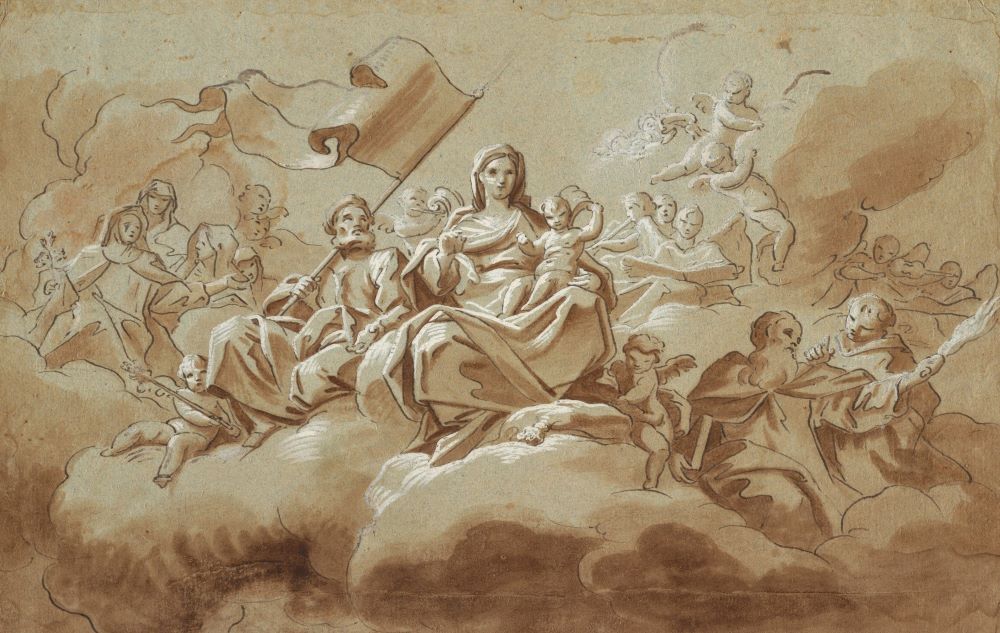
"The Virgin and Child Surrounded by Saints," ca. 1759, Anonymous (Artvee)
We Americans admire people who do the big things. The ones who win the most Super Bowls, run the largest corporations, gross the most at the box office. We Catholics like our saints big as well — founders of religious congregations, towering intellectuals and spiritual masters.
I love and admire the big saints: Francis of Assisi, Teresa of Calcutta, Pope John XXIII. But like you, I also know many saintly people who will never be canonized. They live their lives in virtual anonymity, and their deeds go largely unnoticed.
I'm thinking about men and women whose saintliness I've experienced in person — and who have inspired me to "want to be a better man." They make up my personal litany of small saints.
There are three criteria for inclusion in my litany. First, they need not be deceased. Most of them are still with us — although some have gone to be with God. Second, they would be upset with me for including them on my list. They would claim, with true humility, that many others are far more worthy. Third, they need to have done something miraculous — not be the cause of someone's cure from cancer, but to have performed signs and wonders that bear witness to the power, love and mercy of God in the world.
To get you started on making your own litany of small saints, allow me to introduce you to mine.
Advertisement
In the late 1970s, I brought Communion to folks in a now-defunct parish in a low-income St. Louis neighborhood. On one occasion, I visited the home of a middle-aged woman who appeared to live alone. Her name escapes me all these years later. As we celebrated the ritual of reception of the Eucharist, I noticed a large crib in the adjoining room. When we finished, she said, "Would you like to meet the boy I'm caring for?"
"Yes, of course," I answered.
When I looked into the crib, I saw the severely disabled body of a young man, probably a teenager, his spindly arms and legs badly contorted. He could do nothing for himself, and he was unable to speak. I asked, "Is he your son or your grandson?"
She answered in a matter-of-fact tone: "No. His mother lives down the street. About a year ago, she told me she couldn't care for him anymore; she was exhausted. So, I took him in."
Woman from St. Edward's Parish and all who care for the disabled, pray for us.
At the same parish, I met an elderly man, skinny, poor as a church mouse, who lived in a large, nearly falling down house. I don't remember his name either. He wife had died a year or so earlier. The first time I sat in his living room, he told me his story. He and his wife had no kids of their own, but they had fostered more than 40 children over the years, which had left them penniless. Yet he wanted me to know how blessed his life had been.
Man from St. Edward's and all who foster children, pray for us.
In 2012, Howard, my dad, passed away at age 98. He had lived alone from 1997, when my mom died, until 2008, when he entered a skilled nursing facility. Over the years, his physical and mental health declined, slowly at first, then more quickly after my oldest brother died of cancer in 2002.
As he developed dementia, Howard naturally grew more and more forgetful. And so he called on my sister Susie and my brother-in-law Phil for help. As often as 20 times a day. Sometimes in the middle of the night. He would ask whether he had eaten breakfast. Or taken his pills. Or how to turn on his television. At all times of the day or night, Susie or Phil got in the car and drove several miles to Howard's house simply to reassure him, to check his pill bottles — or to turn on his TV.
Susie and Phil, and all who attend to the needs of aging parents, pray for us.
I've known Father Tom for about 50 years. He was an associate pastor at my family's parish when I was a teen. I reconnected with Tom in the 1990s, during his second stint at the parish. Tom is retired now, and I am part of a group that meets (I should say met, in the pre-COVID era) with him once a month to discuss a spiritual book or article.
For decades, Tom has been there for our poor brothers and sisters — collecting and distributing clothes, gloves and blankets by the thousands; recovering old computers for use by incarcerated people; delivering food to people in need in a poverty-stricken part of outstate Missouri. Even now, in his 80s and wearing a pacemaker, Tom is up at 4:30 a.m. two or three days a week to pick up day-old bread and deliver it to the food pantries.
Father Tom and all servants of God's poor, pray for us.
I want to single out two of the many saints who came to our aid when my wife Terry was diagnosed with brain cancer in the spring of 2017. The first is Mary. She and her husband Chas sat five or six pews in front of us at Sunday Mass in our home parish of St. Vincent de Paul. We knew their names, and we would chat a little bit with them after Mass — but nothing more.
Soon after Terry's diagnosis, Mary approached me and offered to give Terry massages to help her deal with her chemo and radiation treatments. She was a retired physical therapist and wanted to help. Mary showed up faithfully for the better part of a year, and her massages brought Terry relief from her suffering.
Mary, and all who comfort the sick, pray for us.
Cecilia was a member of the staff at the Lutheran retirement community where Terry served as executive director. Their relationship was friendly, but professional. Once when Terry groused about the high cost of dry cleaning, Cecilia started saving coupons for her. It became a standing joke.
When Terry took ill and could no longer work, her staff and colleagues overwhelmed us with cards, letters and gifts of support. But no one outdid Cecilia. Every week, without fail, a card would arrive in the mail with words of encouragement and support. And many of those cards were stuffed with — you guessed it — dry cleaning coupons.
Cecilia, and all messengers of support (and coupons), pray for us.
These saints have no one to champion their cause, no one to pony up the bucks to make it happen. But part of what makes them saintly is that they would never want to be canonized. They would tell anyone who tried to advocate their cause to find something better to do with their time.
The saints in my litany don't do big things in the eyes of the world. And they certainly don't seek recognition for what they do. They follow the narrow path to sainthood — they listen to the word of God, take it to heart, and act on it. This year, let us all pray a litany to the small saints in our lives who make life for all of us better.
All you holy men and women, saints of God, pray for us!





